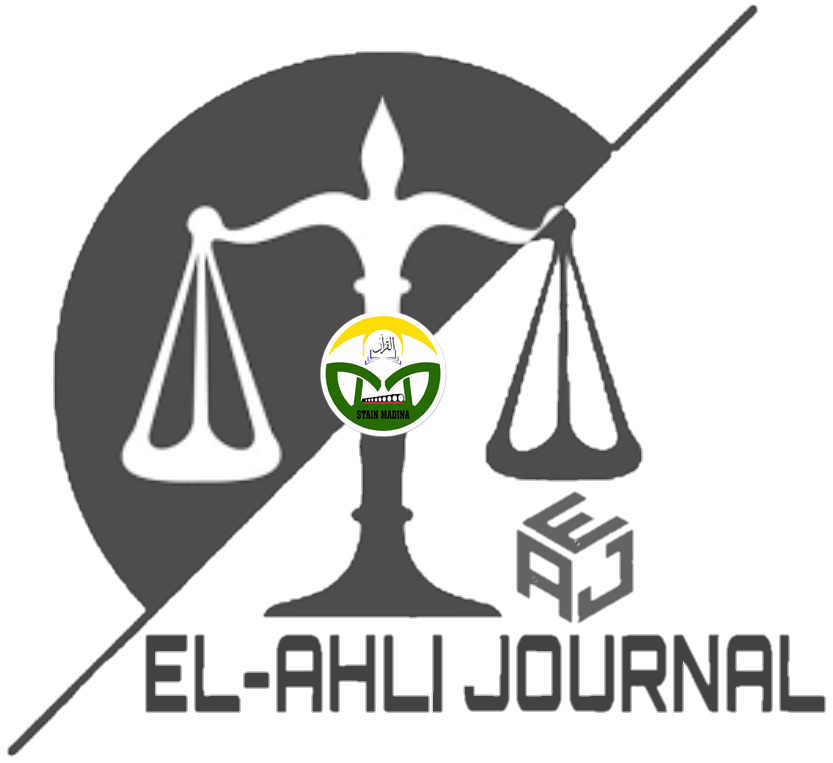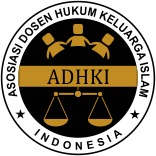AN ANALYSIS OF MAQ??ID AL-SHAR??AH IN THE PRACTICE OF ANGKAP MARRIAGE AMONG THE GAYO ETHNIC GROUP
DOI:
https://doi.org/10.56874/el-ahli.v6i1.2282Keywords:
Angkap Marriage, Maqāṣid al-Sharīʿah, Ḥifẓ al-Māl, Gayo Customary LawAbstract
This study aims to examine the practice of angkap marriage in the Gayo traditional community through the Maqashid Syariah perspective, especially in the aspect of safeguarding property (hifzh al-mal). angkap marriage is a form of social adaptation that arises as a solution to the problem of the absence of sons in a family, as well as the economic obstacles experienced by the male party in carrying out marriage, especially in terms of fulfilling the dowry or edet. This research uses a normative juridical method with a statute approach, namely by analyzing written legal norms and related maqashid sharia principles. The analysis technique used is qualitative. The results show that angkap marriage provides a practical solution in maintaining the continuity of family property through the appointment of a son-in-law as part of his wife's family. The implication is that the husband changes his position in the inheritance system and becomes the protector of his in-laws' property. This tradition does not substantially contradict Islamic law and instead reflects the objectives of Islamic law, namely maintaining benefits, strengthening family resilience, and keeping property in a safe and reliable environment.
References
Apriliana, Alifa Firly, dan Azra Zahrani. 2024. “Hak Dan Kewajiban Terkait Perkawinan Angkap Bagi Masyarakat Gayo Di Tinjau Dari Hukum Islam.” SAMAWA : Jurnal Hukum Keluarga Islam 4(1):3.
Arifa, Nurul, Mutia Urdatul Usqho, dan Muhammad Dinul. 2023. “Efektivitas Peluang Transaksi Online di Era Digital Perspektif Maqasid Syariah (Hifz Al-Mal).” Al Hurriyah : Jurnal Hukum Islam 7(1):57.
Arjani, Nabil Hukama Zulhaiba, Dominick Hoki Pinky, Adisty Puji Nurjayanti, Hanifah Hafshoh, dan Wismanto. 2025. “Pernikahan dalam Islam Membina Keluarga yang Sakinah Mawaddah dan Rahmah.” Ikhlas : Jurnal Ilmiah Pendidikan Islam 2(1):147.
Chalid, Ibrahim, dan Ramlan Kasbi. 2021. “Proses Pelaksanaan Tradisi Adat Pernikahan ‘Naik’ dan ‘Ngalih’ Pada Suku Gayo di Kabupaten Gayo Lues.” Resam Jurnal Hukum 7(1):25.
Coubat, A. Sy. 1984. Adat Perkawinan Gayo. Jakarta: Proyek Penerbitan Buku Sastra Indonesia dan Daerah.
Efendi, Jonaedi, dan Prasetijo Rijadi. 2022. Metode Penelitian Hukum Normatif dan Empiris. 2 ed. Jakarta: Kencana.
Fadhilka, Aulia. 2024. “Perkawinan Angkap Pada Masyarakat Suku Gayo di Kabupaten Aceh Tengah Ditinjau dari Hukum Perkawinan di Indonesia (Suatu Tinjauan Terhadap Hak Atas Harta Bersama bagi Suami).” Skripsi, Universitas Muhammadiyah Sumatera Utara, Medan.
Fahmi, Ahmad. 2019. “Konstruksi Hukum Adat Pernikahan Masyarakat Melayu Palembang Berdasarkan Syari’at Islam.” Medina-Te: Jurnal Studi Islam 15(1):17.
Farhana, Nabila. 2024. “Implementasi Maqashid Syariah Pada Asuransi Syariah di Indonesia.” Jurnal Ilmiah Ekonomi Islam 10(1):59. doi: 10.29040/jiei.v1i1.12305.
Hidayat, Iman Nur, dan Rizka Ramadhani. 2019. “‘Uang Panaik’ Sebagai Syarat Nikah Pada Adat Bugis Dalam Fiqh Islam.” Ijtihad: Jurnal Hukum dan Ekonomi Islam 13(1):24.
Karimullah, Suud Sarim. 2021. “Urgensi Pendidikan Pra Nikah Dalam Membangun Keluarga Sejahtera Perspektif Khoiruddin Nasution.” Kariman 9(2):233.
Maskuroh, Nihayatul. 2013. Etika Bisnis islam. Banten: Pusat Penelitian dan Penerbitan Lembaga Penelitian dan Pengabdian Kepada Masyarakat (LP2M) IAIN Sultan Maulana Hasanuddin.
Pertiwi, Tanza Dona, dan Sri Heriaingrum. 2024. “Menggali Konsep Maqashid Syariah: Perspektif Pemikiran Tokoh Islam.” JIEI: Jurnal Ilmiah Ekonomi Islam 10(1):814.
Pramita, Ayu. 2023. “Tradisi Perkawinan Angkap Bagi Masyarakat Gayu Lues dan Akibat Hukumnya (Studi Kasus Kecamatan Pantan Cuaca).” Skripsi, UIN Ar-Raniry, Banda Aceh.
Prayogi, Arditya, dan M. Jauhari. 2021. “Bimbingan Perkawinan Calon Pengantin: Upaya Mewujudkan Ketahanan Keluarga Nasional.” Islamic Counseling: Jurnal Bimbingan dan Konseling Islam 5(2):224.
Simahara, Elpia, Teuku Yudi Afrizal, dan Fauzah Nur Aksa. 2021. “Pelaksanaan Perkawinan Angkap Pada Masyarakat Adat Gayo Ditinjau Menurut Kompilasi Hukum Islam (Studi Penelitian di Kabupaten Bener Meriah).” Jurnal Ilmiah Mahasiswa Fakultas Hukum (JIM FH) 4(3):114.
Downloads
Published
How to Cite
Issue
Section
License
All articles published in EL-AHLI: Jurnal Hukum Keluarga Islam are licensed under a Creative Commons Attribution-ShareAlike 4.0 International License (CC BY-SA 4.0).
Under this license, authors and readers are free to:
-
Share — copy and redistribute the material in any medium or format.
-
Adapt — remix, transform, and build upon the material for any purpose, even commercially.
Under the following terms:
-
Attribution — You must give appropriate credit, provide a link to the license, and indicate if changes were made. You may do so in any reasonable manner but not in any way that suggests the licensor endorses you or your use.
-
ShareAlike — If you remix, transform, or build upon the material, you must distribute your contributions under the same license as the original.
Copyright and Licensing Policy:
-
The author retains copyright and grants the journal the right of first publication with the work simultaneously licensed under the Creative Commons Attribution-ShareAlike 4.0 International License, which allows others to share the work with acknowledgment of the work’s authorship and initial publication in this journal.
-
Authors are allowed to enter into separate, additional contractual arrangements for the non-exclusive distribution of the journal's published version of the work (e.g., post it to an institutional repository or publish it in a book), with an acknowledgment of its initial publication in this journal.
Link to License:
https://creativecommons.org/licenses/by-sa/4.0/





